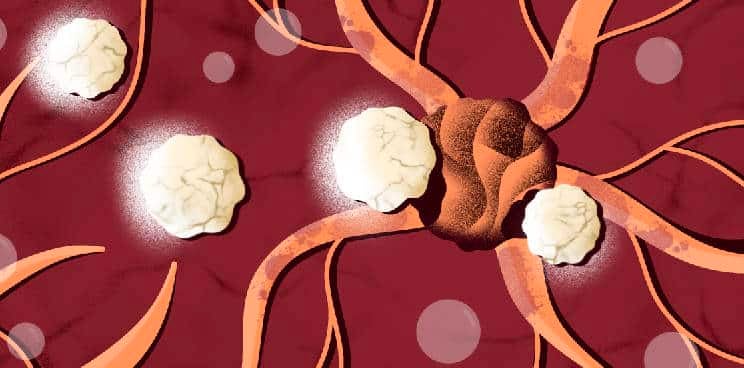Many cancer patients cannot benefit from cancer immunotherapy because their tumors are protected from the immune system. Neobe Therapeutics’ bacterial therapy is designed to strip the tumors of their protective barriers.
The immune system is very good at fighting tumors, and cancer immunotherapies are often able to supercharge our natural defenses to great effect. However, some tumors build up thick fortifications of proteins and glycoproteins that block the entry of immune cells. This is one of the main reasons why immunotherapies benefit only around 20% of patients with solid tumors.
Before founding the U.K. startup Neobe Therapeutics, Pedro Correa de Sampaio carried out academic research on why some tumors are so well protected.
“Even though there is an immune reaction against these tumors, barriers are created within the tumor that prevent the immune cells from going in,” said Correa de Sampaio. “That was a problem that I became very interested in trying to address, but I didn’t feel that academia was the place to address it.”
In early 2021, Correa de Sampaio teamed up with the venture builder Deep Science Ventures and the research charity Cancer Research UK to create Neobe Therapeutics. The company is engineering a bacterial therapy that can travel to the tumor site and rip down the barriers to immune cells.
Bacteria have been researched for their anti-cancer potential for more than a century. One example is Salmonella typhimurium, which was unsuccessfully tested by the company Vion Pharmaceuticals in a phase 1 trial as a treatment for metastatic melanoma in 1999. Nowadays, other companies developing bacteria as weapons against tumors include Prokarium and T3 Pharmaceuticals.
“There are a few other companies that are developing bacterial products to target tumors, but most of them tend to use bacteria to either target cancer cells directly or to trigger an immune reaction within the tumor,” said Correa de Sampaio.
In contrast, Neobe is genetically engineering bacteria to produce an enzyme that can destroy the tumor’s protective walls, akin to a molecular Trojan horse. This could increase the number of patients that benefit from cancer immunotherapies.
One goal for Neobe is making sure the bacteria only produce this enzyme at the tumor site and not in healthy tissue. The firm is programming the bacteria to only activate when they detect high acidity or low levels of oxygen, which are common in a tumor microenvironment. Therefore, even when injected intravenously, the bacteria would only harm tumor tissue.
In its first year since founding, Neobe has focused on building its genetic engineering capabilities and its first two pipeline products. In the next 12 months, the startup plans to complete proof-of-concept preclinical research, with efficacy data available by the end of 2023. Once that’s complete, the company will seek out investments to begin clinical trials by 2026.
One of the challenges to building this new type of therapy is preventing the bacteria from triggering an immune reaction when they are injected into the blood. Correa de Sampaio explained that the company has selected strains of bacteria that are less prone to attacks from the immune system, and will ensure the bacteria can only survive at the tumor site.
Unlike current cancer cell therapies such as CAR-T therapies, the manufacturing process would be relatively straightforward for Neobe’s bacterial therapy.
“Bacteria are easy and cheap to grow, which makes the manufacturing potentially quite accessible,” said Correa de Sampaio. “Usually, you’re fighting to not have them grow in your cultures.”
Nonetheless, the company will be careful to make sure that the bacteria don’t produce their enzymes prematurely while in the manufacturing process.
There is a wide spectrum of companies deploying bacteria to improve human health. Some companies are developing microbiome biotherapeutics to rebalance the ecosystem in the gut while others are focusing exclusively on one strain of bacteria. While this field has seen a mixture of clinical successes and failures, Correa de Sampaio expects a surge in investor interest over the coming years. In the meantime, regulatory agencies need to catch up fast.
“The regulatory guidelines are still very much under development,” he explained. “If we’re open to interacting with the regulators early, and if we make sure that we are engineering our products to be safe — and we are — I think we’ll be able to address it.”





